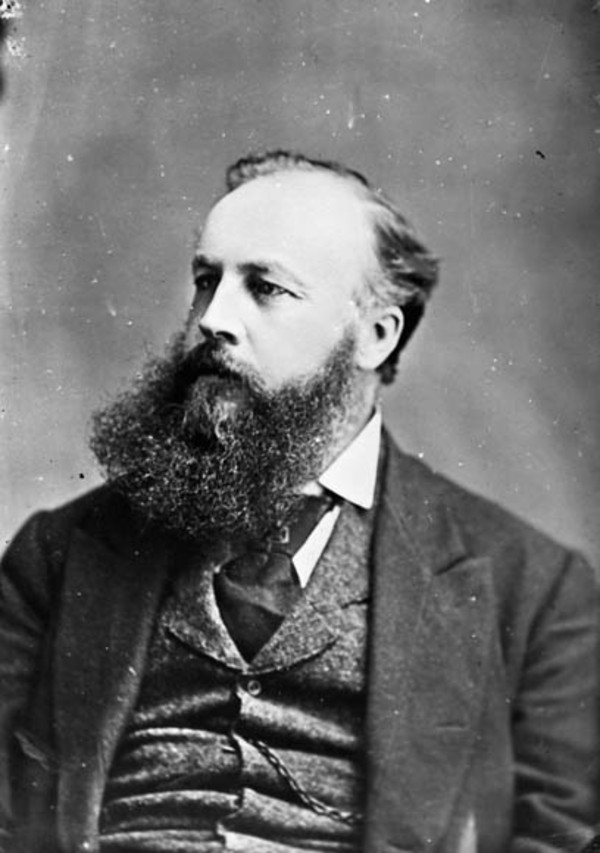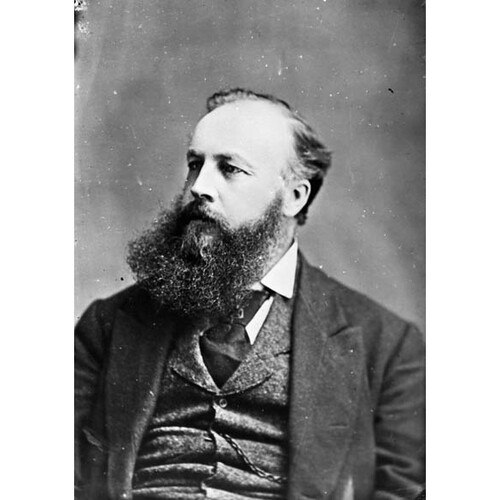CARRALL (Carroll), ROBERT WILLIAM WEIR, doctor and politician; b. 2 Feb. 1837 at Carrall’s Grove, near Woodstock, U.C., son of James and Jane Carrall; d. 19 Sept. 1879 at Carrall’s Grove, Ont.
Robert William Weir Carrall, the grandson of a United Empire Loyalist, described himself as “a patriotic Canadian, descended from a race of patriotic Canadians – one of the oldest families in Canada.” He is said to have been educated at Trinity College, Toronto, though he did not graduate, and he received his md from McGill University in 1859. He practised for a short time in his native country, but late in 1862 he became a “contract” surgeon with the Union forces of the United States and served during the Civil War as acting assistant surgeon. He was on duty first at Emory Hospital, Washington, D.C., from 12 Dec. 1862 to 12 Sept. 1863, and subsequently at the Marine United States General Hospital at New Orleans, La., from 5 Dec. 1863 until his contract was cancelled at his own request on 8 July 1865.
By the end of October 1865 Carrall was established as a medical doctor in Nanaimo, Vancouver Island, where he took an active part in community affairs. He was elected ensign of the Nanaimo Volunteer Rifle Corps and was one of the “musical amateurs” who attempted to organize a brass band. He appears to have also been a freemason, a charter member of the Nanaimo Lodge no.1090, A.F. & A.M.
In 1867 Carrall left Nanaimo for Barkerville, where he practised his profession and also invested in various mines. The mining records for 1868 show that he had an interest in two companies on Williams Creek, and he is said to have been “the lucky owner of two shares in the rich Minnehaha claim.” Confederation was now in the air, and Carrall, from the first “a zealous advocate” of the scheme, was chairman on 23 Nov. 1867 of a large meeting at Barkerville which passed a resolution in favour of confederation. He was reported as declaring that “we will span the continent with a cordon of thinking, energetic, pulsating humanity, and a railroad will follow as a consignment [sic] to their necessities.” For Carrall had returned from his 1862–65 sojourn in the United States “a greater Canadian than ever,” and he could foresee his native Canada stretching from ocean to ocean, still part of the British empire and enabled by means of a transcontinental railroad “to compete with the United States for the European immigration.” Carrall reported the feeling in the Cariboo to Sir John A. Macdonald*, whom he was later to eulogize as “a mighty Prince” and “the great father of this young Dominion . . . one of the nation-makers.” Macdonald urged him to “keep the Union fire alight until it burns over the whole Colony,” and Carrall did his utmost.
In the October 1868 election, in which confederation was the main issue, he gained a seat on the Legislative Council, on which he served until 1871. In January 1870 Governor Anthony Musgrave*, taking every precaution to ensure confederation and well aware of the doctor’s correspondence with Sir John, gave him a seat on the Executive Council, and on 20 April he was appointed one of the three delegates to Ottawa to discuss the terms of British Columbia’s union with Canada. In Ottawa, Carrall was the only delegate to have an interview with Macdonald, who was too ill to take part in the general negotiations, in which Carrall’s role was to “make the most” of the interior of British Columbia and its economic value to Canada. After the triumph of the British Columbia delegation Carrall remained for a time in his native province, and on 31 Dec. 1871 he was appointed to the Senate.
He took his seat on 11 April 1872 as one of the three senators from British Columbia and made his maiden speech on 22 May on the insolvency laws. His most notable achievement came in 1879, during the last session before his death, when he introduced the bill “to make the first day of July a Public Holiday by the name of Dominion Day.” He had made the proposal, apparently, as soon as he entered the Senate, but such a measure was deemed inexpedient at that time, for “some of the provinces were new in the harness of Confederation, and were restive – Nova Scotia to wit.” In 1879 it was B.C. which was “irritated and restive,” as Carrall admits. Nevertheless, he thought, “now is the time to legislate for a complete crystallization of the factions of the Dominion into one harmonious whole,” by establishing one particular day as a national holiday, as every other country has done. He himself, he adds, has “always loved the Dominion dearly. I helped to bind it together, and I have worked since with all the energy I possessed by vote and voice, to consolidate it.” In spite of the opposition of his fellow senator from British Columbia, Clement Francis Cornwall (who felt that the union of his province with Canada had “not been so consummated as to render it expedient that we should establish any particular day as a recognition of Confederation”), Carrall’s bill was passed.
A “good natured, sociable and companionable” bachelor, who “knew everybody almost between Halifax and Cariboo,” Carrall seems to have thoroughly enjoyed his life in Ottawa, though he complained privately in 1872 that he was “worked to death socially – Dinners or Dances every night, and all the next day the anguish of having lost my heart which I invariably do from one to four times every night, oh! why was I created with such susceptibilities? or why on earth [are] the girls so sweet!!!” Just a few months before his death Carrall was married in Ottawa on 8 May 1879 to Mrs Elizabeth Amelia Macdonald Gordon, daughter of a former sheriff of Goderich, who survived him. Local tradition has it that Carrall married the widowed sweetheart of his youth so that he could leave her his property.
He is said to have died of “ulceration of the stomach.” This was probably a condition of long standing, for George A. Walkem*, then premier of British Columbia, wrote privately to Sir John from Victoria on 29 Nov. 1878 that he was “afraid poor Carrall’s days will be numbered. Liver, kidneys, & stomach are all badly affected & the doctor considers his recovery hopeless. He is of course in bed.” Nevertheless Carrall rallied sufficiently to return to Ottawa to take part in the session of 1879 and to carry through with fortitude and spirit his cherished bill to establish Dominion Day.
PABC, Robert William Weir Carrall correspondence, 1866–76; J. S. Helmcken, “Reminiscences” (5v. unpublished typescript, 1892), V. PAC, MG 26, A (Macdonald papers), correspondence with R. W. W. Carrall, 1868–78; correspondence regarding R. W. W. Carrall, 1870–87. National Archives (Washington), Old Military Records Division, Bureau of Medicine and Surgery, Medical officers file, R. W. W. Carrall. British Columbia, Legislative Council, “Debate on the subject of confederation with Canada,” Government Gazette Extraordinary (Victoria), March 1870. Canada, Senate, Debates, 1872–79. Cariboo Sentinel (Barkerville, B.C.), 1868–71. Colonist (Victoria), 4 Oct. 1879. Nanaimo Gazette, 1865–66. Victoria Daily Standard, 4 Oct. 1879. Can. directory of parliament (Johnson). Can. parl. comp., 1873; 1874; 1875; 1878; 1879. M. A. Ormsby, British Columbia, chap. 9; “Relations between British Columbia and the Dominion of Canada,” unpublished phd thesis, Bryn Mawr College, [1934]. British Columbia & confederation, ed. W. G. Shelton (Victoria, 1967), especially Brian Smith, “The confederation delegation,” 195–216.
Cite This Article
Dorothy Blakey Smith, “CARRALL (Carroll), ROBERT WILLIAM WEIR,” in Dictionary of Canadian Biography, vol. 10, University of Toronto/Université Laval, 2003–, accessed April 29, 2025, https://www.biographi.ca/en/bio/carrall_robert_william_weir_10E.html.
The citation above shows the format for footnotes and endnotes according to the Chicago manual of style (16th edition). Information to be used in other citation formats:
| Permalink: | https://www.biographi.ca/en/bio/carrall_robert_william_weir_10E.html |
| Author of Article: | Dorothy Blakey Smith |
| Title of Article: | CARRALL (Carroll), ROBERT WILLIAM WEIR |
| Publication Name: | Dictionary of Canadian Biography, vol. 10 |
| Publisher: | University of Toronto/Université Laval |
| Year of revision: | 1972 |
| Access Date: | April 29, 2025 |




